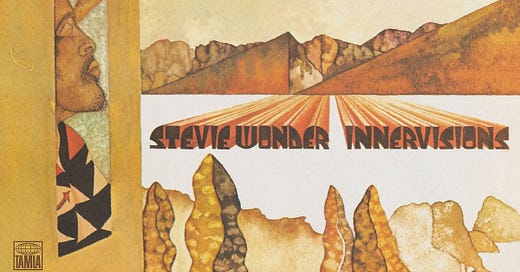Got a counterfeit dollar in his hand
Stevie Wonder - 'He's Misstra Know-It-All' (Innervisions 1973)
By August 1973, Stevie Wonder was already deep into what people now call his Classic Period. I prefer to think of it as a Golden Period, given the yellows, browns and oranges used in his album artwork during this period of colossal artistic and commercial achievement.1
Once Wonder came of age, he received ten years of accrued royalties from Motown and was able to negotiate a new contract with complete artistic freedom. You can see the artistic growth as he comes to grips with making albums and not merely collections of songs from this point. One of the significant influences here would have been the direction Marvin Gaye took with his career at the start of the decade and his masterpiece What’s Going On. This creative freedom allowed Wonder to start writing and releasing more than ‘just’ love songs. Talking Book bettered Music of My Mind and Innervisions improved on both. Innervisions features subject matter such as drug addiction, reincarnation, religion and, most impressively, racial inequalities across the seven minutes of urban soundscape in ‘Living For The City’.
One under-acknowledged part of Stevie Wonder’s music is that at this point, he was essentially a one-person band. Except for backing vocals, guitars and some additional percussion, everything you hear is played by Wonder. Drums, pianos, synthesisers, Moog bass, other percussion, and harmonica. One characteristic of Wonder’s drum playing is open hi-hats which give the cymbals a splashing and slushy sound2 that you can hear in ‘He's Misstra Know-It-All’.
The song is a slower, almost ballad-like effort and a near solo performance from Wonder3. Most prominent is Wonder’s deployment of the TONTO modular synthesiser - it produces the floating birdsong flute that you first hear trilling at the seventeen-second mark - the use of which on the album was pioneering and influential for such a significant recording artist. Much like ‘Livin’ For The City’, there’s a split in the song at the halfway mark as Wonder’s voice shifts to his raspier and harsher tone; Handclaps are added after this section where the song shifts into an extended outro.
While the song wasn’t a big 1973 hit in the US, it did have some success in the UK, where it reached number 10 in May 1974. Maybe it might have been more successful if it had been released at the denouncement of the Watergate scandal and Richard Nixon’s resignation. Three Stevie Wonder songs are commonly signposted about being references to the then US President. First in the chronology is ‘Big Brother’ on Talking Book, and in 1974, Fulfillingness' First Finale’s ‘You Haven’t Done Nothing’4. ‘He's Misstra Know-It-All’ fits into this trilogy by clearly being a detailed read-out on a too smart for his own good confidence trickster.
While there is plenty for us to go in if it is “Tricky Dicky” who is the subject of this song, and there’s no sense that Wonder has shied away from that interpretation, there’s enough to suggest it may just be a general swipe at some of the more nefarious forces of capitalism in the USA. - Wonder had been working in the music industry for well over a decade at this point, so it wouldn’t be surprising if he’d encounter people with plans and counterfeit dollars as well as those;
Playin’ hard, talkin’ fast
Making sure that he won’t be the lastHe’s Misstra Know-It-All
We are also told this is the kind of person who would renege on a handshake and not pay a debt but not only that, they would say that that’s the only way to be and others should follow the same path. The glee in which this character is so sure that they are living the optimal way makes Wonder sound rueful and sad for this person before giving way to angrier and seemingly justified indignation.
More than anything, he sounds tired, and while I have no experience of living in the USA in the early 1970s, I’m starting to know what that is like, at least.
Next week: Prince and R.E.M.
For the record, Five albums with four in the US top five, two at number one including Songs in the Key of Life certified Diamond. 11 singles making the top 40 hits, including eight top tens and five chart-toppers. 12 Grammys, including three for album of the year.
Willie Weeks is on electric bass.
If we are to judge a protest song on impact, Wonder released the single on the 7th August 1974, and Richard Nixon resigned on the 9th of August 1974 - were it not a coincidence, you’d have to mark it as one of the most influential protest songs of all time.




